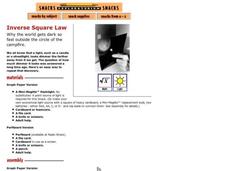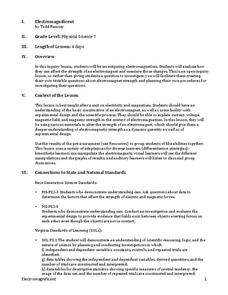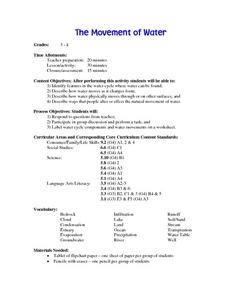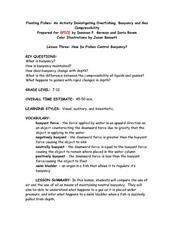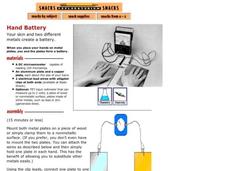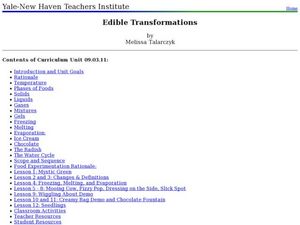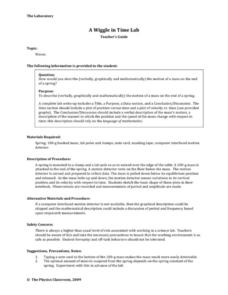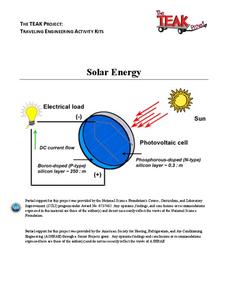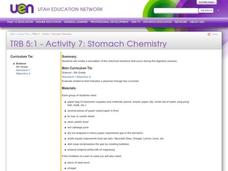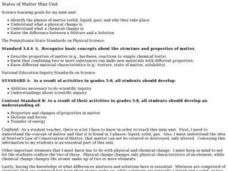NASA
Pop Can Hero Engine
Hang a soda can from a string and watch it spin by the force created by water streaming out of slanted holes. This plan provides background information, detailed materials and procedures, discussion questions, a lab worksheet, and...
Curated OER
Can You Adapt?
Using the Montana State Quarter, learners engage in activities designed to help increase their understanding about how animals must change their social and physical behaviors in order to adapt to their environment. Excellent worksheets...
Exploratorium
Inverse Square Law
The inverse square law is revealed when your class participates in this activity. They move a graph paper or perfboard square back and forth in a square of light to see how the intensity changes. You will definitely want to add this...
STEM for Teachers
Electromagnificent
This physics pun really hertz, but this STEM lesson plan can help. The inquiry-based activity has young scientists create a testable question about electromagnetic strength; plan and implement their own experiments; and record and...
Curated OER
The Movement of Water
Here is an excellent lesson plan on the water cycle and the states in which water exists. Learners identify the features of the water cycle, describe how water changes form, and look at ways that people affect the natural movement of...
Curated OER
Producing a Strain of E. coli that Glows in the Dark
Students observe the experimental process called bacterial transformation and demonstrate phenotype changes in bacteria that have been transformed with an antibiotic-resistance gene and a metabolic marker. They create a luminescent...
Curated OER
Floating Fishes: How do Fishes Control Buoyancy?
Playing with balloons, water, oil, and bottles help put this lesson over the top! Participants use air-filled balloons in water tanks to experience gas compression. They also use oil-filled bottles to experiment with buoyancy. Included...
Exploratorium
Hand Battery
Get hands-on in your physical science class by having learners conduct electricity with their own hands! By placing one hand on each of two different metals, a current can be generated and measured on a microammeter. Make an experiement...
Curated OER
Applied Science -Physics (2B) Pre Lab
Second graders look at different types of energy. In this energy lesson, 2nd graders define energy and the difference between kinetic and potential energy. They see examples with falling books and a slinky.
Curated OER
Edible Transformations
Students differentiate the different phases of matter. In this chemistry lesson plan, students conduct several hands-on exercises to discover how matter transforms when mixed together. They identify the different stages in the water cycle.
NASA
Space Shuttle Glider
Your charges will enjoy putting together this model of the space shuttle and completing the three challenge activities described in the lesson. The worksheets embedded in the plan that pupils use to cut out their gliders are beautifully...
Curated OER
Watershed Works: Unit 1
By constructing a watershed model and identifying watershed features in it, they discover how water erosion changes the landscape. As with most watershed modeling activities, this one is costly in terms of time and materials. It is,...
Physics Classroom
A Wiggle in Time Lab
Though an alternative method is suggested, the best way to carry out this investigation is with the use of a computer-interfaced motion detector. Physics fanatics hang a mass on the end of a spring and analyze its motion verbally,...
Texas State Energy Conservation Office
Investigation: Gas Laws in Action - Propane
Using helium as an example of propane, physical science middle schoolers experiment with and graph the relationship between temperature and volume in gases. In a whole-class demonstration, they show how molecules behave under different...
Texas State Energy Conservation Office
Nuts! Calculating Thermal Efficiency
Oh nuts! Do macadamias or almonds produce more thermal energy? Energy enthusiasts find out with this experiment. The objective is to demonstrate to your class how the chemical energy contained in foods can be converted into useable...
Exploratorium
Laser Jello
The concepts of refraction and reflection gel with your physical science class during this colorful exploration. Shining lasers through Petri-dish-shaped gelatin desserts, they will notice how the light travels and bounces off the sides....
Exploratorium
Polarized Sunglasses
Reflected waves of light move within a plane, and because of this, polarizing materials can reduce the glare our eyes see. This resource explains how to set up a demonstration of this effect. Consider it for use in your physical science...
Rochester Institute of Technology
Solar Energy
Warm up to the idea of solar energy. A lesson plan includes three activities that challenge scholars to apply knowledge in new ways. First, they learn to run an alarm clock without a battery by using solar energy. Next, they complete an...
Science 4 Inquiry
Expanding the Universe
When Einstein first heard the theory of the expanding universe, he dismissed it as bad physics. Now scholars learn about the theory and how scientists prove it has merit. Through a hands-on simulation and videos, class members measure...
Physics Classroom
Who Can See Who?
While only briefly mentioned in most Physics books, plane mirrors and their applications offer the basics necessary for future studies. While working through an interactive, pupils demonstrate knowledge of both reflection and its forms....
Curated OER
Equilibrium: What Is It?
Tenth graders investigate chemical, physical and mechanical equilibrium. In this equilibrium activity, 10th graders participate in a physical activity to show equilibrium by some students standing and some students sitting at the same...
Curated OER
Energy and Matter
A review of a full unit on energy and matter, this slide show starts with basic definitions of states of matter and their mass. It then develops the ideas of the forces that that matter can exert. Details about bonding within matter and...
Utah LessonPlans
Stomach Chemistry
Students will create a simulation of the chemical reactions that occur during the digestive process. A physical change occurs when the appearance of matter changes, but the composition of the matter does not change.
Curated OER
States of Matter Mini-Unit
Students identify he phases of matter (solid, liquid, gas), and why they take place. They comprehend what a physical change is and what a chemical change is. Students know the difference between a Mixture and a Solution.
Other popular searches
- Chemical and Physical Changes
- Physical Changes of Matter
- Matter Physical Changes
- Physical Changes in Matter
- Chemical Physical Changes
- Chemistry Physical Changes
- Chemical or Physical Changes
- Physical Changes of States
- Physical Changes Laboratory
- Physical Changes in Teens
- Matter Physical Changes
- Physical Changes of Water




